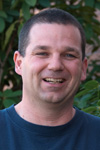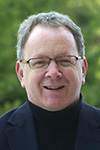Christopher Wallis, CADRE Chair (2015)
Beginning a career in federal civil service can be a challenging process, even for those who have previously collaborated or worked within United States Department of Agriculture-Agricultural Research Service (USDA-ARS) or other federal government labs. At first, it may seem like an almost never-ending pile of paperwork and loads of acronyms from all directions. 
 But many plant pathologists have successfully built strong careers working for the federal government, and their experience should prove useful in navigating the first few years in what is, hopefully, a very long, productive career.
But many plant pathologists have successfully built strong careers working for the federal government, and their experience should prove useful in navigating the first few years in what is, hopefully, a very long, productive career.
Below are some words of advice from Mark Mazzola (pictured left), USDA-ARS in Wenatchee, WA, and Walt Mahaffee (pictured right), USDA-ARS in Corvallis, OR, for early career scientists taking their first steps in a career as a federal government scientist.
Breathe…
According to Walt, keep in mind that a research program (lab) does not build itself overnight no matter how many hours you put in. Expect it to take two years (or more) to get fully running. Instead of forcing things, take time to allow your body and mind to recharge at a normal rate.
…but get started quickly.
Even though you should take time to fully recharge, be sure to make the most of the time you have. Mark advises that you should take steps to get your program up and running as quickly as possible by relying on existing collaborations and bringing projects along with you. Walt agrees that you should not fill your schedule with only new projects. Budget your time and prioritize writing up completed projects, including those finished before you arrived, to demonstrate your accomplishments. Putting completed projects off for the future is dangerous because you may not end up with as much ‘spare’ time as you might expect.
Remember anything government (like USDA-ARS) is political…
Walt mentions to never forget that Congress controls the purse and stakeholders tell them what to do. Get to know your stakeholders and the problems they are facing. Make every effort to demonstrate the value of your research and how it helps solve those problems. Keep in mind that impact is a very important phrase.
... so be sure to distinguish yourself and demonstrate your great potential!
Mark mentions that the first review (after the two-year probationary review) is mostly about whether or not you, as a scientist, have the potential to be a success. So think smaller projects that can lead to potentially bigger, very impactful research. Also, take on research that demonstrates a unique role in the world of science, as that will show you have the potential to fill knowledge gaps in the future rather than just being one of a crowd. Do keep in mind that groundbreaking projects often fail. Do not get discouraged, and be ready to travel multiple paths as a result. The key is to demonstrate the potential for one (or more) of the research paths to lead to great impact down the road.
Keep the peace…
Walt mentions to realize that your research leader (and other scientists) has a lot on their plate (and research leaders don’t get paid extra), so make extra efforts to make their lives easier. Ditto for others in management and administration staff. It will benefit you greatly.
... and reach beyond your workplace.
Walt mentions to realize that even with government funding, it is quite beneficial to write grants. Not only do they increase your research capacity and serve as an effective way to bring in students or post-docs, but also grants demonstrate your ability to collaborate, and builds reputation and impact. Regarding collaborations, Mark mentioned that for established scientists, it is very important to have nation-wide and international collaborations. To form those, it is best to attend the APS and international conferences and be open to nurture multi-national collaborations from folks met at these events.
Some final thoughts…
Mark suggests to cast as wide of a net as possible- you never know what you might find yourself up to in research or what could make your career. Walt says never hesitate to go far afield from current expertise to solve a problem. You might have graduated doing rhizosphere ecology and in 20 years be working on fluid mechanics and transport of airborne pathogens and largely collaborating with engineers.
And Walt mentions that “If you aren’t having fun, you’re doing it wrong.” Can’t argue with that!
